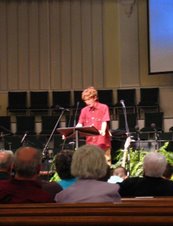1:13,14 - "He has rescued us from the power of darkness and transferred us into the kingdom of his beloved Son, in whom we have redemption, the forgiveness of sins."
--Four atonement terms here: God "rescues" us from the power of darkness, "transfers" us into the kingdom of the Son, "redeems" us and "forgives" our sins. "Forgiveness of sins" here also defines "redemption." This comes in the context of Paul's prayer for the Colossians in 1:3-14, and specifically in the context of Paul's prayer for their gratefulness to the Father.
1:19-22 - "For in him all the fullness of God was pleased to dwell, and through him God was pleased to reconcile to himself all things, whether on earth or in heaven, by making peace through the blood of his cross.
And you who were once estranged and hostile in mind, doing evil deeds, he has now reconciled in his fleshly body through death, so as to present you holy and blameless and irreproachable before him...."
--Another atonement word here, "reconcile" (opposed to "estranged" in v. 21). This comes at the end, and indeed climax, of Paul's Christological theological reflection starting in v. 15. The Son, who is the "image" of God and "firstborn" of creation (15), is the one through whom all things, visible and invisible (including the "thrones or dominions or rulers or powers"), were created (16). In 18 he is called simply "the beginning" or "the firstborn from the dead." vv. 19-20 see Christ's conciliatory work as the key example of his deity and supremacy.
1:24 - "I am now rejoicing in my sufferings for your sake, and in my flesh I am completing what is lacking in Christ's afflictions for the sake of his body, that is, the church."
--What does it mean to "complete what is lacking in Christ's afflictions"? Is some sort of atonement implied here? Apparently Paul though this phrase would easily understood by his Colossian audience, because he offers no explanation.
2:12-15 - "When you were buried with him in baptism, you were also raised with him through faith in the power of God, who raised him from the dead. And when you were dead in trespasses and the uncircumcision of your flesh, God made you alive together with him, when he forgave us all our trespasses, erasing the record that stood against us with its legal demands. He set this aside, nailing it to the cross. He disarmed the rulers and authorities and made a public example of them, triumphing over them in it."
--Here, the human problem, which Christ atones for, is our "death" according to the legal demands of the record of our trespasses. Does this come from the "rulers and authorities" or is their disarmament a secondary accomplishment of the Atonement? This passage is framed by references to "philosophy and empty deceit, according to human tradition, according to the elemental spirits of the universe" (2:8) and "a human way of thinking" (18). The "legal demands" of v.14 then seem to be not the Law but human philosophies (e.g. "Do not handle, Do not taste, Do not touch," 2:21) that "have an appearance of wisdom in promoting self-imposed piety, humility and severe treatment of the body" (23).
2:20 - "If with Christ you died to the elemental spirits of the universe, why do you live as if you still belonged to the world?"
--This verse continues ideas and themes from 2:8-19. In Christ we did not just die to sin but to the "elemental spirits" (NIV, NASB: "elementary principles") as well.
Subscribe to:
Post Comments (Atom)

No comments:
Post a Comment